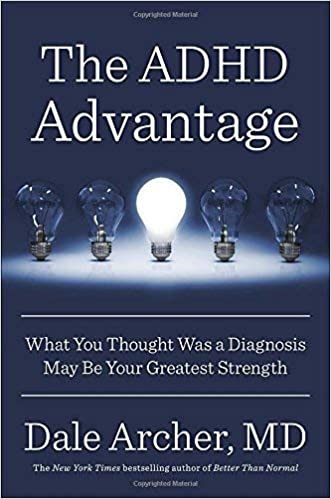College Students with ADHD Must Read these Five Books!
Updated: June 19, 2024
Published: November 11, 2021

Attention-deficit hyperactivity disorder (ADHD) is one of the most common neurodevelopmental disorders of childhood that often lasts into adulthood. Students with ADHD have a unique set of challenges when it comes to focused learning, especially in conventional learning environments. That’s exactly why they need a specific set of tools and strategies to manage their symptoms. While there are many treatment recommendations available for children and adults facing this challenge, some additional knowledge and tips always comes in handy.
Here are five great books for people with ADHD that can also benefit college students wanting to develop better strategies to manage their higher education. And these books can also be a good resource for their family members and/or loved ones because awareness helps to better understand what comes along with this challenge and deal collectively with it.
5 Great Books for Students with ADHD
1. Driven to Distraction Recognizing & Coping with Attention Deficit Disorder from Childhood Through Adulthood
Written by two doctors, Edward M Hallowell and John J. Ratey, this book shares the stories of their patients, including both children and adults. The doctors cover the various forms that ADD and ADHD can take. The chapters are segmented by topic, including the child with ADD, adult ADD, relationships with ADD, the family and ADD, as well as how to manage ADD. By reading the book, those with ADHD and those who know someone with ADHD can gain insight into various treatment options and coping mechanisms. Additionally, the book’s tone provides an uplifting outlook by focusing on the positive attributes of having ADHD, such as creativity, enthusiasm, and high energy.
2. Focused Forward: Navigating the Storms of Adult ADHD
Written by James M. Ochoa, this book can help adults with ADHD in learning how to cope. The author himself has ADHD, and so, he shares various management and scheduling techniques, but he also brings in the emotional aspect of those affected by ADHD. With a focus on how ADHD affects the brain, his book helps readers to alleviate what he coins to be the “Emotional Distress Syndrome” that’s closely associated with the ADHD experience. The book provides eight different tools that help ADHD people cope.
For college students, there’s undoubtedly a lot to already deal with, including academic stressors, as well as the emotional changes that come along with increased independence. This book is a great read for those looking to balance their emotional state of mind by managing productivity despite ADHD.
3. Spark: The Revolutionary New Science of Exercise and the Brain
This is yet another book written by bestselling author and renowned psychiatrist John J. Ratey, MD, with help from Eric Hagerman. It is focused on how physical exercise can aid in beating stress, which can be an effective coping mechanism for students with ADHD.
The research within the book touches on specific conditions such as ADHD, anxiety, stress, and depression. The book explains how exercise can help to improve all of these conditions. In fact, it includes case studies that have proven the connection between exercise and the brain. For example, the local school district in Naperville, Illinois initiated a revolutionary Physical Education (P.E.) curriculum that ended up causing their school district’s science test scores to be first in the world.

4. Organizing Solutions for People with ADHD
Written by Susan Pinsky, Organizing Solutions for People with ADHD is divided into categories to provide people with ADHD across circumstances with practical organizing solutions to live with the disorder. The chapters are: “At Work” (focused on time management, organization, and prioritization), “At Home” (how to pay bills on time, schedule appointments, declutter, etc.), “With Kids” (grocery shopping, making meals, doing laundry, organization, and more), “And You” (how to create schedules that provide time for one’s social life, gym, hobbies, etc.).
College students can clearly fit into one or many of these categories. Within the book, there are photos, sidebars, and testimonials, which makes it easier for a reader with ADHD to remain engaged with the content.

5. The ADHD Advantage
Through his book, Dale Archer shares how the diagnosis of having ADHD, which can often be perceived to be a weakness, may just as well turn out to be the greatest strengths that one possesses. Dr. Archer highlights success stories of people with ADHD to offer an inspiring look at what it’s like to have ADHD and offer a positive outlook for what it could bring in one’s future.
He focuses on how people with ADHD are abundantly curious and tend to be highly adventurous. He shares stories that showcase how to take smart risks and attain success while remaining resilient to life’s challenges. Dr. Archer has ADHD and has never taken medication to manage it. Instead, he uses research and science within the book to promote positivity and guide people with ADHD to recognize their full potential.
Closing Thoughts
These books offer just a glimpse of the different ways that students with ADHD can learn to cope and overcome challenges associated with having anxiety and/or ADHD. From the physical, to the mental, to the emotional, each book offers a different perspective and angle at which to approach ADHD.
As you can see from the authorship, they are written by those within the medical profession, and many of the authors themselves have ADHD. Recommendations and strategies straight from someone who is the most understanding of what it’s like to live with ADHD are more likely to work for people facing this challenge.
Plus, if you don’t feel like reading each book, consider checking out the audiobook links referenced above.. This way, you can listen on your commute to school, while you work out, or at any other time you feel you want to plug in.
